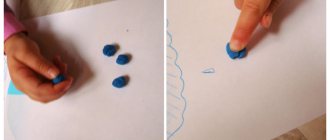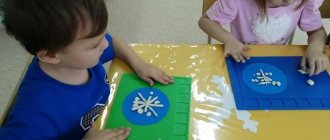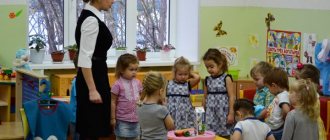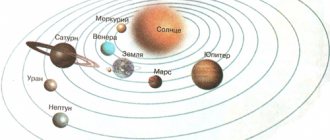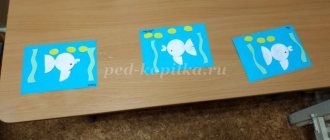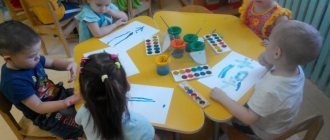Preview:
. Summary of educational activities for modeling for children of primary preschool age “Kitten”
The purpose of the GCD: to teach children to sculpt a four-legged animal - a cat.
Tasks: to consolidate sculpting techniques: rolling plasticine between the palms; consolidate the ability to connect parts, pressing them tightly against each other. Develop independence. Cultivate accuracy when working with plasticine.
Preliminary work: conversations with children about pets, looking at illustrations, reading fiction and educational literature, riddles, didactic games: “Who lives where?”, “Where is whose cub?”, “Find out by description.”
Materials: plasticine on boards (for each child) and separately on plates, stacks, oilcloths, boards, a modeling support diagram with an image (a kitten, a magnetic board, a layout with multi-colored balls, a disk with background music for the practical part.
Let's say "Hello!" each other.
Hi all!" and “Good afternoon!”;
Q: Guys, look, guests have come to us. Let's say hello to them. D: Good morning!
Q: Guys, come to me, please. Look what we have on the table?
Q: What kind of pet do you think likes to play with balls?
Q: Look how many glomeruli there are, are they the same? What color and shape are they?
D: red, yellow, etc. multi-colored, round.
Q: Guys, there are balls, but there is no one to play with them. What can we do?
Q: Let's make kittens so they can play with them.
Q: And in order for your ears to listen to me carefully, and your eyes to see what I’m going to show, let’s play with you.
Wash your cheeks with your paw (act in accordance with the text)
Right eye left eye
Q: After being kittens, we turn into guys and sit down in our seats. We sit down straight, backs straight, eyes on me.
Q: And now I’ll show you how to make a kitten.
Here I have a large piece of plasticine. I tear off a smaller piece - this will be the head of our kitten. Now I tear off an even smaller piece from a larger piece - this will be the tail of our kitten. And from this remaining piece of plasticine I will sculpt the body of our kitten. I will roll this piece of plasticine into a sausage. Then I take the stack and make longitudinal cuts on both sides of this sausage. These will be our kitten's paws. Now we take a piece from which I will roll a ball - this will be the head of our kitten. The ball can be rolled between straight palms or between the palm and the table.
We flatten the plasticine on both sides of the ball with two fingers (thumb and index) and we will get ears. Let's take buckwheat grains and make eyes, take a very small piece of black plasticine, roll a small ball between our fingers - this will be the kitten's nose. Then we take pieces of wire and attach whiskers to our kitten on both sides. Now we press the head to the body. There is a small piece of plasticine left, from which we will roll out a small sausage - this will be the kitten’s tail. We attach it to the body. Look what a wonderful kitten I got.
Finger gymnastics: “Kittens”
(We fold our palms, press our fingers together)
Our cat has ten kittens,
(We shake our hands without separating them)
Now all the kittens are in pairs:
(Tap the corresponding fingers against each other from the big to the little finger) Calm music sounds. Children make their own pet.
Self-analysis NOD: throughout the entire NOD maintained the children's interest in the result. Each child was actively involved in activities throughout the entire NOD. The children tried to use plasticine carefully.
Source
"Gifts for a kitten." Summary of GCD for modeling in the second junior group
Anna Maksimova
"Gifts for a kitten."
Abstract of GCD on modeling in the second junior group “ Gifts for a kitten ” Summary of GCD in the educational field “Artistic creativity” (
modeling ) in
the second junior group .
Topic: " Gifts for a kitten ."
Goal: Learn to sculpt plasticine balls.
Objectives: To introduce domestic animals and their babies, to develop the skill of word formation of nouns denoting baby animals; to cultivate a love for pets and a desire to take care of them, a kind attitude towards animals; learn to use acquired skills.
Materials and equipment: soft toys (cat and kitten , U balls, modeling , plasticine.
Lesson summary for the first junior group on modeling “Like our cat...”
Summary of a modeling lesson on the topic “Like our cat...”
Goals :
learning the ability to roll out plasticine with straight movements between the palms, lay out “sausages” sequentially one after another, forming a mat; strengthening the ability to act on a signal in an outdoor game. introduce the content of a Russian folk song; develop the ability to listen to poetic text; learn to pronounce onomatopoeic words, answer questions based on the content.
Progress of the lesson.
Organizing time.
V o p i t a t e l . One animal came to see us today. It is soft and fluffy. But the mice are afraid of him. Who is it? ( Yes, it's a cat
.) (
Puts a cat toy on the table.)
2. Main part. Reading a Russian folk song.
V o s p i t a t e l. Look how beautiful the cat is. No wonder they wrote a song about him:
Like our cat’s fur coat is very good,
Like a cat's mustache of amazing beauty,
Bold eyes, white teeth.
Educator:
What kind of fur coat does the cat have?
( The cat’s fur coat is soft
.) Show where the cat’s eyes, whiskers, and teeth are.
(Children complete the task
.) How does the cat meow?
( Children pronounce onomatopoeia.)
The teacher reads the nursery rhyme again, inviting the children to show on the toy what it says
.
F ys cul t min u tka “Cat”
Children imitate the movements of kittens: they wash themselves, get on all fours, and arch their backs.
Educator:
We love our cat very much.
We always give him something tasty. What does the cat like to eat? (Fish, drinks milk.)
-
Look, kids, our cat is sad: he wanted to sleep, but he couldn’t find his favorite rug. The cat says his rug was striped. The teacher consoles the kitten and invites the children to help the cat and make a striped rug for it. Shows a blank made of cardboard - this will be a rug, and stripes can be made from multi-colored plasticine.
3. Modeling the rug.
The teacher invites the children to sit at the tables and stretch their fingers.
Finger gymnastics
:
All the kittens washed their paws like this, like this!
We washed our ears, we washed our bellies like this, like this!
And then they played like this, like this!
And then they got tired and fell asleep sweetly
Then he explains and shows how to roll the plasticine between your palms to get a long strip.
-First, we pinch off a small lump from a large lump of plasticine; from the lump of plasticine we roll out a stick or sausage. ( Show techniques for rolling out a “stick” with straight movements of the palms.)
This is the stick I got. Then we pinch off plasticine of a different color and roll out another sausage - a stick, and so we need to roll out several multi-colored sausages. Look at the colorful stripes you get.
